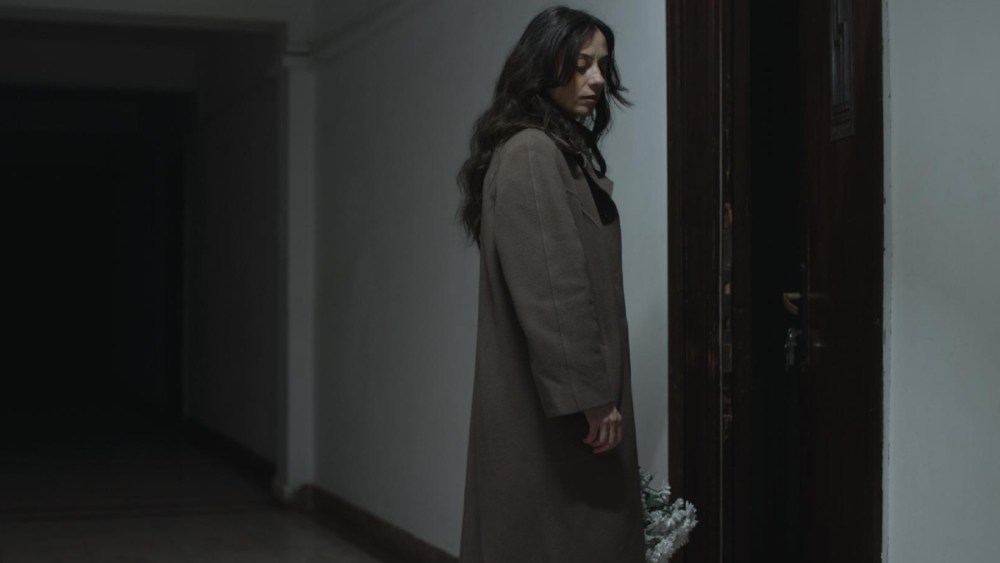Expanding on the world built in his 2021 short “Intercom 15,” Andrei Epure’s debut feature “Don’t Let Me Die” is an evocative exercise in “sabotaging realism.” Shot across Bucharest and Romania’s seaside, the director offers an elusive portrait of enigmatic Isabela (Elina Löwensohn) through the encounters of restrained neighbour Maria (Cosmina Stratan), who finds the older woman’s body outside their apartment building. This discovery becomes a tear in the banal fabric of everyday life, in which Maria reluctantly assumes the triad of caretaker, undertaker and executor – faced with a series of subdued and, at times, perverse bureaucratic exchanges.
Sold by Lights On and co-written by Epure and producer Ana Gheorghe, “Don’t Let Me Die” vies for prizes at the Locarno Film Festival’s Filmmakers of the Present. The film is produced by top Romanian production house Saga Film, also behind Radu Jude’s “Dracula” at this year’s Locarno. It teams with co-producers Handplayed (Bulgaria), Tomsa Films (France), Arrogant Films (Romania), and Conceptual Lab by Theo Nissim (Romania).
Speaking with Variety, the Bucharest-based filmmaker describes how he disrupts the “fragile frontier” between binaries – life and death, human and animal, real and unreal – that bleed through the film’s experientiality. Screeching into the building intercom, Isabela seemingly undertakes a part-bestial metamorphosis during her final moments, not too dissimilar from the howling of the two dogs she leaves behind. The leitmotif of unanswered doorbells, unacknowledged wails, and unsoothed whimpers punctuates the passivity of Epure’s surreal world.
“Sound has this really nice quality of igniting the imagination,” he explains, emphasizing its violent and primal qualities, “used in horror because it’s sensorially overwhelming.” While “Don’t Let Me Die” isn’t a conventional horror film, its sonic landscape suspends us in an eerily liminal environment: “I wanted to render the presence and absence of [Isabela] through sound.” In a Duchampian turn of phrase, Isabela and Maria take turns as “guest” and “host” in each other’s lives, the two roles consumed within the portmanteau of “ghost”.
The key characters share in their alterity and summon the animalistic archetype of the stray, behaviorally and physiologically. Through long tracking shots, Epure frequently captures Maria roaming passageways, with purpose but never entirely at home in her surroundings. After six years working abroad, Isabela’s son Dan (Silviu Debu) returns home upon the news of her death; while interrogating the clerical mess with Maria, Dan confesses that he and his mother share a vestigial tail.
Epure takes inspiration from the strigoi of Romanian folklore, a spectral creature neither living nor dead. Seeking a conscious departure from the contemporary cinematic traditions of his home country – cultivated by the likes of Cristi Puiu and Corneliu Porumboiu – he “questions realism and its artificiality through soft ruptures.” Whether it’s the absurdist language used in conversation between two physiotherapy patients, or tenants squabbling over plumbing repairs co-signed by “He-of-the-Great-Event,” these pockets of perception unveil this unusual world. “I wanted Maria to have this impression that something is happening, but she’s not part of it – everybody else is in some kind of an agreement or conspiracy.”
“There is this paradoxical element of being both a witness and a participant,” adds Epure. Just like Maria, “a medium [through which] Isabela somehow permeates,” it’s these binaries that the viewer of “Don’t Let Me Die” is invited to negotiate.
